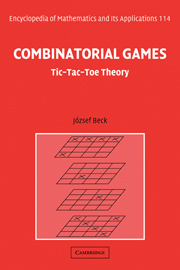Book contents
- Frontmatter
- Contents
- Preface
- A summary of the book in a nutshell
- PART A WEAK WIN AND STRONG DRAW
- Chapter I Win vs. Weak Win
- Chapter II The main result: exact solutions for infinite classes of games
- PART B BASIC POTENTIAL TECHNIQUE – GAME-THEORETIC FIRST AND SECOND MOMENTS
- PART C ADVANCED WEAK WIN – GAME-THEORETIC HIGHER MOMENT
- PART D ADVANCED STRONG DRAW – GAME-THEORETIC INDEPENDENCE
- Appendix A Ramsey Numbers
- Appendix B Hales–Jewett Theorem: Shelah's proof
- Appendix C A formal treatment of Positional Games
- Appendix D An informal introduction to game theory
- Complete list of the Open Problems
- What kinds of games? A dictionary
- Dictionary of the phrases and concepts
- References
Chapter I - Win vs. Weak Win
Published online by Cambridge University Press: 06 July 2010
- Frontmatter
- Contents
- Preface
- A summary of the book in a nutshell
- PART A WEAK WIN AND STRONG DRAW
- Chapter I Win vs. Weak Win
- Chapter II The main result: exact solutions for infinite classes of games
- PART B BASIC POTENTIAL TECHNIQUE – GAME-THEORETIC FIRST AND SECOND MOMENTS
- PART C ADVANCED WEAK WIN – GAME-THEORETIC HIGHER MOMENT
- PART D ADVANCED STRONG DRAW – GAME-THEORETIC INDEPENDENCE
- Appendix A Ramsey Numbers
- Appendix B Hales–Jewett Theorem: Shelah's proof
- Appendix C A formal treatment of Positional Games
- Appendix D An informal introduction to game theory
- Complete list of the Open Problems
- What kinds of games? A dictionary
- Dictionary of the phrases and concepts
- References
Summary
Chess, Tic-Tac-Toe, and Hex are among the most well-known games of complete information with no chance move. What is common in these apparently very different games? In either game the player that wins is the one who achieves a “winning configuration” first. A “winning configuration” in Tic-Tac-Toe is a “3-in-a-row,” in Hex it is a “connecting chain of hexagons,” and in Chess it is a “capture of the opponent's King” (called a checkmate).
The objective of other well-known games of complete information like Checkers and Go is more complicated. In Checkers the goal is to be the first player either to capture all of the opponent's pieces (checkers) or to build a position where the opponent cannot make a move. The capture of a single piece (jumping over) is a “mini-win configuration,” and, similarly, an arrangement where the opponent cannot make a move is a “winning configuration.”
In Go the goal is to capture as many stones of the opponent as possible (“capturing” means to “surround a set of opponent's stones by a connected set”).
These games are clearly very different, but the basic question is always the same: “Which player can achieve a winning configuration first?”.
The bad news is that no one knows how to achieve a winning configuration first, except by exhaustive case study. There is no general theorem whatsoever answering the question of how. The well-known strategy stealing argument gives a partial answer to when, but doesn't say a word about how.
- Type
- Chapter
- Information
- Combinatorial GamesTic-Tac-Toe Theory, pp. 17 - 90Publisher: Cambridge University PressPrint publication year: 2008



